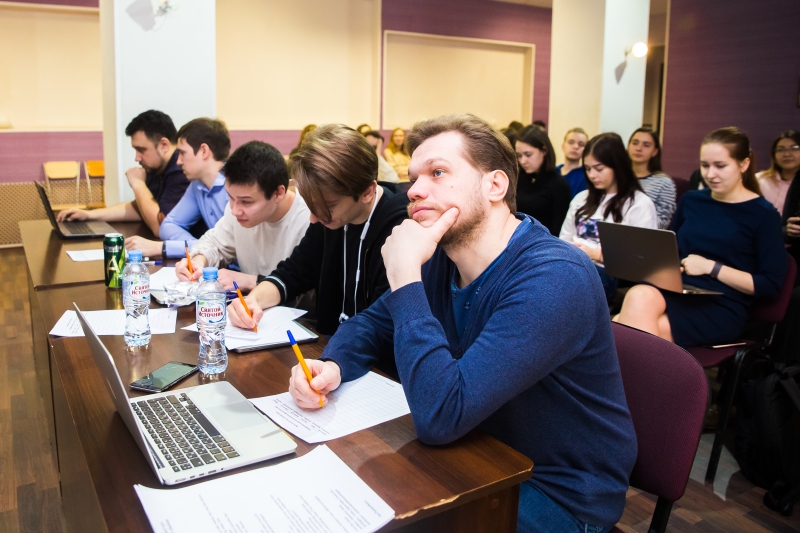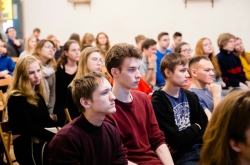The hackathon's goal is to help students learn about the various professions in IT and make a conscious choice of their future development paths. According to its organizers, there are many: young specialists can try themselves at testing, network administration, and many other fields. What's more, participation in the event is regarded as practical training.
"Practical training is an important part of the educational process for specialists in just about any field. It is a chance to spark the students' interest in their profession by offering them to apply their theoretical background in real life. This is why I, as the event's organizer, aimed to make the event interesting and beneficial for all participants. Our choice of format wasn't random. A hackathon presents a great opportunity to teach the students to work in teams, distribute their responsibilities, manage their time, assess their competencies in what has to do with implementing their ideas and so on. What's more, the students could not only choose from the topics they were offered, but also suggest their own ideas, which offered them a chance to focus on the fields they are most interested in. We encouraged every idea and initiative, and were always ready to give advice and help with any emerging problems," explains Anton Govorov, an assistant at the Faculty of Infocommunication Technologies and the event's main organizer.
The hackathon lasted two weeks, and involved workshops and individual work that focused on developing a ready software product. Prior to the event, the organizers Anton Govorov, an assistant at the Faculty of Infocommunication Technologies, Elizaveta Kobets, a chief engineer at the Faculty of Infocommunication Technologies, associate professor Natalia Gorlushkina and the Faculty's Executive Dean Anton Suprun addressed representatives of different organizations in St. Petersburg who required help with developing IT solutions. Among the projects who responded were the cultural and educational project "Unknown St. Petersburg", the “Svetly Mir” (bright world -- Rus.) foundation, and the marketing agency Zolle.
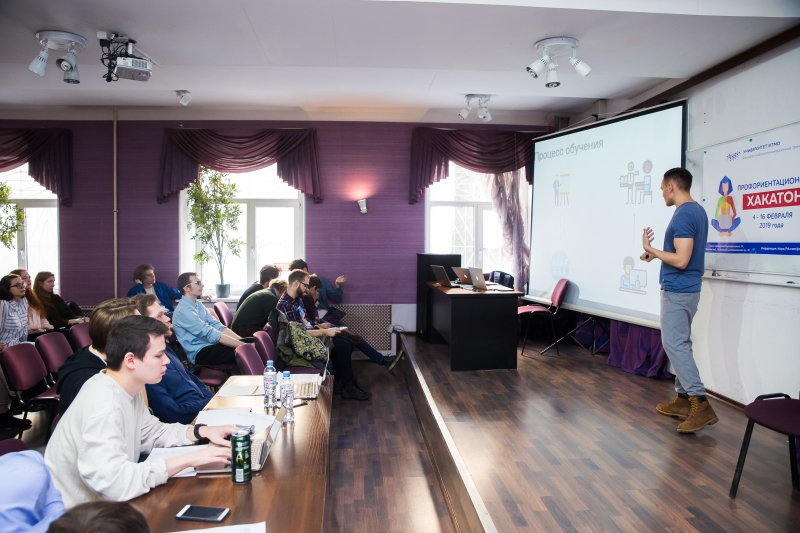
The hackathon came to a close on February 16 when the participants presented their projects to the jury. Among its experts were such specialists from the IT industry as Maksim Antonov, a programmer for Tektosoft LLC, Yuri Ibraev, a product designer at Aviasales.ru, Vlad Kosinov, an interface engineer for enapter.com, and Anton Fedyanin, the head of the front-end development department at kupibilet.ru.
"One of the most important issues in the relationship between educational establishments and the labor market is how they perceive each other, comments Vlad Kosinov. On one hand, many students believe that educational programs are overestimated, on the other, there's a lack of job seekers with good training. Direct communication between students and companies helps correct the expectations of both parties by showing the students' actual level of training and the companies' shortage of personnel".
Winning projects
The third place went to an idea that was proposed by the students: the app Flodgy which allows its users to share information about the products they like.
"Flodgy is not a social network like Instagram and not a retail service like Avito or Aliexpress. We position our project as something bigger. With the help of our app, people will be able to easily "share" the item they bought and find products to their liking. In order to attract more users, we also added an opportunity to earn: a user can add a referral link to a store and get a percentage of the sales. The moderation of content is conducted by the users themselves: they vote for the best posts and thus move them forward in the feed," explain the app's authors Aleksandr Nosochenko, Vladislav Pivosh, and Alexey Voronov.
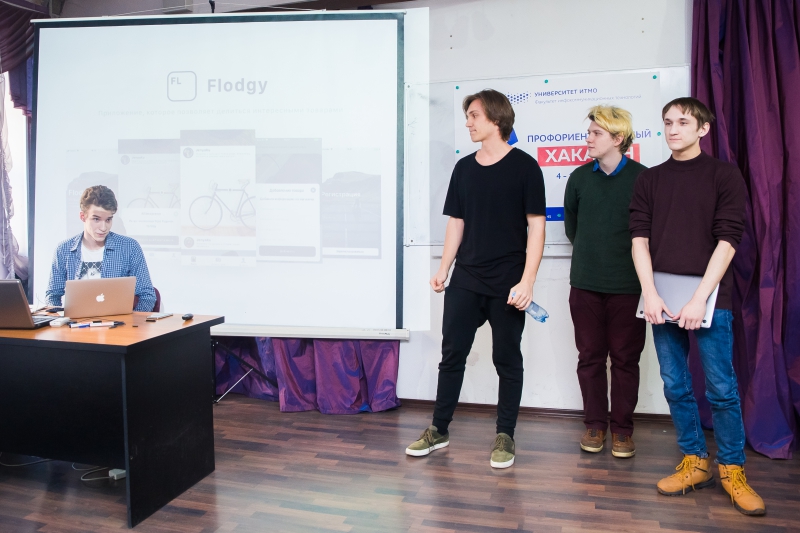
The first and second place went to two teams with completely different cases. The team Hindu presented a city navigation app, and team Force Majeure built a Telegram bot to help users find the cheapest train tickets.
"Buying train tickets is something we all do, and many would've liked to automate this process in order to save their time. For this reason, we decided to offer an opportunity to search for, and buy, train tickets with the help of a popular messenger app," explain the hackathon's participants Andrei Zimarin, Aleksandr Reiband and Nikita Maksimov.
In order to achieve their goal, the students scraped the website tutu.ru using Python. Upon receiving a query from the user, the new bot analyses the offers found on the Internet and proposes the fastest and cheapest route.
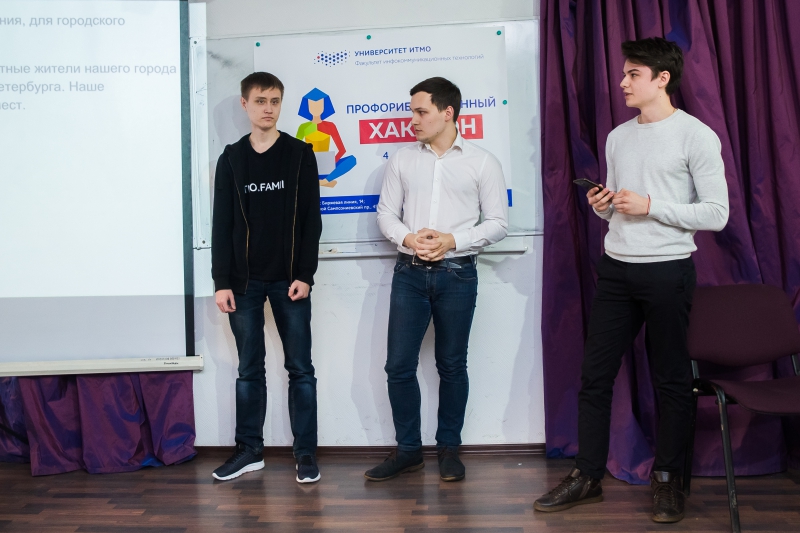
Another winning project is a cross-platform application for navigating in the city. According to its developers Ilya Zakaulov, Rostislav Nurdinov, Maksim Pahmurin and Denis Arlakov, their website will help the citizens of St. Petersburg learn about new interesting places while playing. Registered users will be able to choose quests to their liking when they head out for a stroll.
Apart from the winning projects, the jury denoted several individual projects that can help facilitate various educational processes. EduCI by Denis Tereshinko helps lecturers save time when checking laboratory assignments and provides students with instant feedback. Ivan Yakushev customized a module for collecting and analyzing a user's metadata for the purpose of identifying anomalies when following online courses.
The teams Hindu and Force Majeure, as well as authors of EduCI and the module for collecting and analyzing a user's metadata got the jury's special prizes.
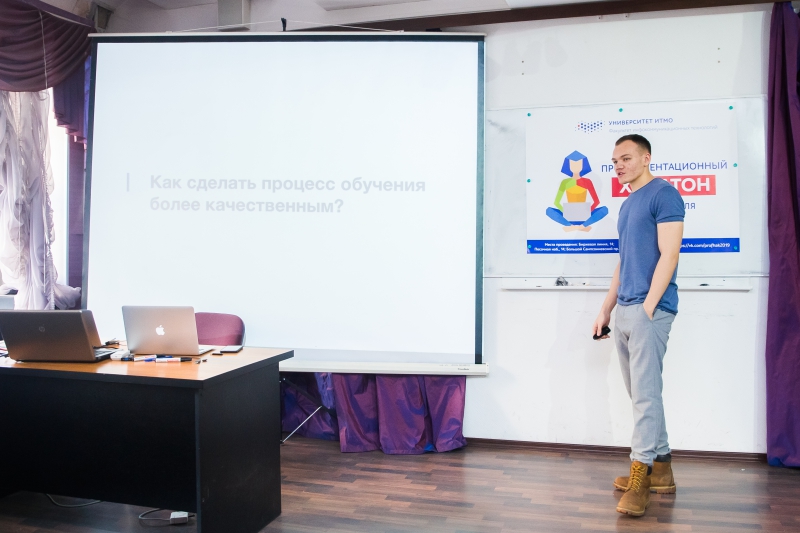
"We are happy with the results, comments Anton Govorov. They show that the students have a high level of training after just three years at the university. We also want to note that in comparison with last year's hackathon, the level of the recent projects was even higher, and there were no poor ones. The students were really passionate about their work, and showed advanced knowledge in their corresponding fields."
According to Elizaveta Kobets, the career guidance hackathon is already becoming an annual event. In 2020, the organizers plan to invite speakers with unique knowledge and competencies in IT, and offer more interesting tasks to ITMO students.
